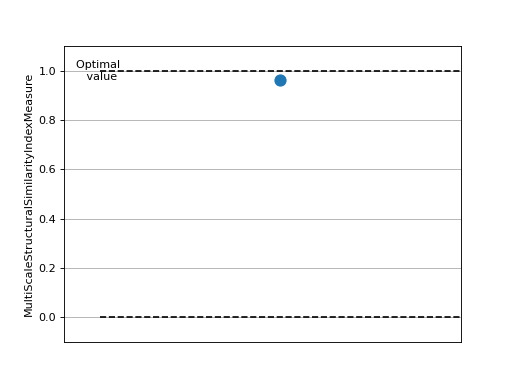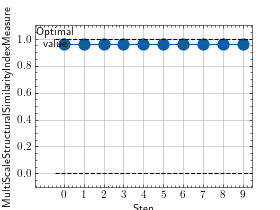Multi-Scale SSIM¶
Module Interface¶
- class torchmetrics.image.MultiScaleStructuralSimilarityIndexMeasure(gaussian_kernel=True, kernel_size=11, sigma=1.5, reduction='elementwise_mean', data_range=None, k1=0.01, k2=0.03, betas=(0.0448, 0.2856, 0.3001, 0.2363, 0.1333), normalize='relu', **kwargs)[source]¶
Compute MultiScaleSSIM, Multi-scale Structural Similarity Index Measure.
This metric is is a generalization of Structural Similarity Index Measure by incorporating image details at different resolution scores.
As input to
forwardandupdatethe metric accepts the following inputAs output of forward and compute the metric returns the following output
msssim(Tensor): ifreduction!='none'returns float scalar tensor with average MSSSIM value over sample else returns tensor of shape(N,)with SSIM values per sample
- Parameters:
gaussian_kernel¶ (
bool) – IfTrue(default), a gaussian kernel is used, if false a uniform kernel is usedkernel_size¶ (
Union[int,Sequence[int]]) – size of the gaussian kernelsigma¶ (
Union[float,Sequence[float]]) – Standard deviation of the gaussian kernelreduction¶ (
Literal['elementwise_mean','sum','none',None]) –a method to reduce metric score over labels.
'elementwise_mean': takes the mean'sum': takes the sum'none'orNone: no reduction will be applied
data_range¶ (
Union[float,tuple[float,float],None]) – the range of the data. If None, it is determined from the data (max - min). If a tuple is provided then the range is calculated as the difference and input is clamped between the values. Thedata_rangemust be given whendimis not None.k1¶ (
float) – Parameter of structural similarity index measure.k2¶ (
float) – Parameter of structural similarity index measure.betas¶ (
tuple[float,...]) – Exponent parameters for individual similarities and contrastive sensitivities returned by different image resolutions.normalize¶ (
Literal['relu','simple',None]) – When MultiScaleStructuralSimilarityIndexMeasure loss is used for training, it is desirable to use normalizes to improve the training stability. This normalize argument is out of scope of the original implementation [1], and it is adapted from https://github.com/jorge-pessoa/pytorch-msssim instead.kwargs¶ (
Any) – Additional keyword arguments, see Advanced metric settings for more info.
- Returns:
Tensor with Multi-Scale SSIM score
- Raises:
ValueError – If
kernel_sizeis not an int or a Sequence of ints with size 2 or 3.ValueError – If
betasis not a tuple of floats with length 2.ValueError – If
normalizeis neither None, ReLU nor simple.
Example
>>> from torch import rand >>> from torchmetrics.image import MultiScaleStructuralSimilarityIndexMeasure >>> preds = torch.rand([3, 3, 256, 256]) >>> target = preds * 0.75 >>> ms_ssim = MultiScaleStructuralSimilarityIndexMeasure(data_range=1.0) >>> ms_ssim(preds, target) tensor(0.9628)
- plot(val=None, ax=None)[source]¶
Plot a single or multiple values from the metric.
- Parameters:
val¶ (
Union[Tensor,Sequence[Tensor],None]) – Either a single result from calling metric.forward or metric.compute or a list of these results. If no value is provided, will automatically call metric.compute and plot that result.ax¶ (
Optional[Axes]) – An matplotlib axis object. If provided will add plot to that axis
- Return type:
- Returns:
Figure and Axes object
- Raises:
ModuleNotFoundError – If matplotlib is not installed
>>> # Example plotting a single value >>> from torch import rand >>> from torchmetrics.image import MultiScaleStructuralSimilarityIndexMeasure >>> preds = rand([3, 3, 256, 256]) >>> target = preds * 0.75 >>> metric = MultiScaleStructuralSimilarityIndexMeasure(data_range=1.0) >>> metric.update(preds, target) >>> fig_, ax_ = metric.plot()

>>> # Example plotting multiple values >>> from torch import rand >>> from torchmetrics.image import MultiScaleStructuralSimilarityIndexMeasure >>> preds = rand([3, 3, 256, 256]) >>> target = preds * 0.75 >>> metric = MultiScaleStructuralSimilarityIndexMeasure(data_range=1.0) >>> values = [ ] >>> for _ in range(10): ... values.append(metric(preds, target)) >>> fig_, ax_ = metric.plot(values)

Functional Interface¶
- torchmetrics.functional.image.multiscale_structural_similarity_index_measure(preds, target, gaussian_kernel=True, sigma=1.5, kernel_size=11, reduction='elementwise_mean', data_range=None, k1=0.01, k2=0.03, betas=(0.0448, 0.2856, 0.3001, 0.2363, 0.1333), normalize='relu')[source]¶
Compute MultiScaleSSIM, Multi-scale Structural Similarity Index Measure.
This metric is a generalization of Structural Similarity Index Measure by incorporating image details at different resolution scores.
- Parameters:
preds¶ (
Tensor) – Predictions from model of shape[N, C, H, W]target¶ (
Tensor) – Ground truth values of shape[N, C, H, W]gaussian_kernel¶ (
bool) – If true, a gaussian kernel is used, if false a uniform kernel is usedsigma¶ (
Union[float,Sequence[float]]) – Standard deviation of the gaussian kernelkernel_size¶ (
Union[int,Sequence[int]]) – size of the gaussian kernelreduction¶ (
Literal['elementwise_mean','sum','none',None]) –a method to reduce metric score over labels.
'elementwise_mean': takes the mean'sum': takes the sum'none'orNone: no reduction will be applied
data_range¶ (
Union[float,tuple[float,float],None]) – the range of the data. If None, it is determined from the data (max - min). If a tuple is provided then the range is calculated as the difference and input is clamped between the values.k1¶ (
float) – Parameter of structural similarity index measure.k2¶ (
float) – Parameter of structural similarity index measure.betas¶ (
tuple[float,...]) – Exponent parameters for individual similarities and contrastive sensitivities returned by different image resolutions.normalize¶ (
Optional[Literal['relu','simple']]) – When MultiScaleSSIM loss is used for training, it is desirable to use normalizes to improve the training stability. This normalize argument is out of scope of the original implementation [1], and it is adapted from https://github.com/jorge-pessoa/pytorch-msssim instead.
- Return type:
- Returns:
Tensor with Multi-Scale SSIM score
- Raises:
TypeError – If
predsandtargetdon’t have the same data type.ValueError – If
predsandtargetdon’t haveBxCxHxW shape.ValueError – If the length of
kernel_sizeorsigmais not2.ValueError – If one of the elements of
kernel_sizeis not anodd positive number.ValueError – If one of the elements of
sigmais not apositive number.
Example
>>> from torch import rand >>> from torchmetrics.functional.image import multiscale_structural_similarity_index_measure >>> preds = rand([3, 3, 256, 256]) >>> target = preds * 0.75 >>> multiscale_structural_similarity_index_measure(preds, target, data_range=1.0) tensor(0.9628)
References
[1] Multi-Scale Structural Similarity For Image Quality Assessment by Zhou Wang, Eero P. Simoncelli and Alan C. Bovik MultiScaleSSIM
